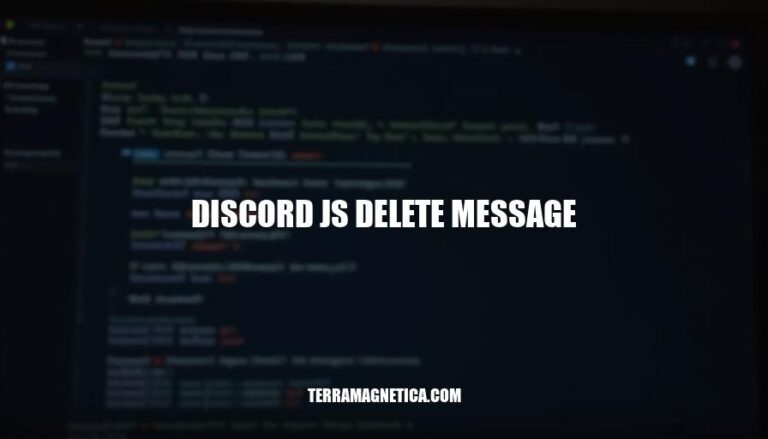


Discord.js is a powerful library for interacting with the Discord API using JavaScript. One of its key features is the ability to delete messages. The delete message function allows server administrators and bot developers to remove unwanted or inappropriate messages, helping to maintain a clean and organized server environment. This is crucial for managing content, enforcing rules, and ensuring a positive community experience.
Here’s a step-by-step guide:
Install Node.js:
Create a new project:
mkdir my-discord-bot
cd my-discord-bot
npm init -y
Install discord.js:
npm install discord.js
Create a bot on Discord:
Create a basic bot script:
index.js and add the following code:const { Client, GatewayIntentBits } = require('discord.js');
const client = new Client({ intents: [GatewayIntentBits.Guilds, GatewayIntentBits.GuildMessages, GatewayIntentBits.MessageContent] });
client.once('ready', () => {
console.log('Bot is online!');
});
client.on('messageCreate', message => {
if (message.content === '!delete') {
message.delete()
.then(msg => console.log(`Deleted message from ${msg.author.username}`))
.catch(console.error);
}
});
client.login('YOUR_BOT_TOKEN');
Run the bot:
node index.js
This setup will allow your bot to delete messages when a user types !delete. Make sure to replace 'YOUR_BOT_TOKEN' with your actual bot token.
Here’s how you can delete a single message using Discord.js:
Install Discord.js:
npm install discord.js
Create a bot and get its token from the Discord Developer Portal.
Set up your project:
const { Client, GatewayIntentBits } = require('discord.js');
const client = new Client({ intents: [GatewayIntentBits.Guilds, GatewayIntentBits.GuildMessages] });
client.once('ready', () => {
console.log('Bot is online!');
});
client.login('YOUR_BOT_TOKEN');
Delete a message:
client.on('messageCreate', async message => {
if (message.content === '!delete') {
// Replace 'MESSAGE_ID' with the ID of the message you want to delete
const messageId = 'MESSAGE_ID';
const channel = message.channel;
try {
const msg = await channel.messages.fetch(messageId);
await msg.delete();
console.log('Message deleted');
} catch (error) {
console.error('Error deleting message:', error);
}
}
});
Replace 'YOUR_BOT_TOKEN' with your bot’s token and 'MESSAGE_ID' with the ID of the message you want to delete. When a user sends !delete in the channel, the bot will delete the specified message.
To delete multiple messages at once using discord.js, you can use the bulkDelete method. Here’s a step-by-step guide with examples and best practices:
Set Up Your Bot:
Ensure you have a Discord bot set up and discord.js installed. If not, you can set it up using:
npm install discord.js
Create a Command to Delete Messages:
Add a command in your bot’s code to handle message deletion. Here’s an example:
const { Client, Intents } = require('discord.js');
const client = new Client({ intents: [Intents.FLAGS.GUILDS, Intents.FLAGS.GUILD_MESSAGES] });
client.once('ready', () => {
console.log('Bot is online!');
});
client.on('messageCreate', async message => {
if (message.content.startsWith('!delete')) {
// Check if the user has the necessary permissions
if (!message.member.permissions.has('MANAGE_MESSAGES')) {
return message.reply('You do not have permission to delete messages.');
}
// Parse the number of messages to delete
const args = message.content.split(' ');
const amount = parseInt(args[1]);
if (isNaN(amount) || amount < 1 || amount > 100) {
return message.reply('Please provide a number between 1 and 100.');
}
// Delete the messages
try {
await message.channel.bulkDelete(amount, true);
message.channel.send(`Deleted ${amount} messages.`).then(msg => {
setTimeout(() => msg.delete(), 5000);
});
} catch (err) {
console.error(err);
message.channel.send('There was an error trying to delete messages in this channel.');
}
}
});
client.login('YOUR_BOT_TOKEN');
Permissions:
Ensure that the bot and the user invoking the command have the MANAGE_MESSAGES permission. This prevents unauthorized users from deleting messages.
Error Handling:
Implement error handling to manage potential issues, such as trying to delete messages older than 14 days (which bulkDelete cannot do).
Rate Limits:
Be mindful of Discord’s rate limits. Avoid deleting large numbers of messages too frequently to prevent your bot from being rate-limited.
Feedback:
Provide feedback to users after messages are deleted, such as a confirmation message that auto-deletes after a few seconds.
Security:
Never hard-code your bot token in your code. Use environment variables to store sensitive information.
By following these steps and best practices, you can efficiently delete multiple messages in a Discord channel using discord.js.
Here are some common errors when using discord.js to delete messages and how to troubleshoot them:
Unknown Message Error:
message.delete().catch(error => {
if (error.code !== 10008) { // 10008 is the code for Unknown Message
console.error('Failed to delete the message:', error);
}
});
Missing Permissions:
MANAGE_MESSAGES permission.if (!message.guild.me.hasPermission('MANAGE_MESSAGES')) {
console.log('I need the MANAGE_MESSAGES permission to delete messages!');
} else {
message.delete().catch(console.error);
}
Rate Limiting:
const deleteMessage = async (message) => {
try {
await message.delete();
} catch (error) {
if (error.code === 50013) { // 50013 is the code for Missing Permissions
console.error('Missing permissions to delete the message.');
} else {
console.error('Failed to delete the message:', error);
}
}
};
Invalid Message Object:
if (message && !message.deleted) {
message.delete().catch(console.error);
} else {
console.log('Message is invalid or already deleted.');
}
Here are some advanced techniques for deleting messages in Discord.js:
Delete Messages by User:
const userId = 'USER_ID';
channel.messages.fetch({ limit: 100 }).then(messages => {
const userMessages = messages.filter(msg => msg.author.id === userId);
channel.bulkDelete(userMessages);
});
Delete Messages Containing Specific Words:
const keyword = 'KEYWORD';
channel.messages.fetch({ limit: 100 }).then(messages => {
const keywordMessages = messages.filter(msg => msg.content.includes(keyword));
channel.bulkDelete(keywordMessages);
});
Delete Messages Older Than a Certain Time:
const timeLimit = 24 * 60 * 60 * 1000; // 24 hours in milliseconds
channel.messages.fetch({ limit: 100 }).then(messages => {
const oldMessages = messages.filter(msg => Date.now() - msg.createdTimestamp > timeLimit);
channel.bulkDelete(oldMessages);
});
Scheduled Deletions:
const schedule = require('node-schedule');
// Schedule to delete messages every day at midnight
schedule.scheduleJob('0 0 * * *', () => {
channel.messages.fetch({ limit: 100 }).then(messages => {
channel.bulkDelete(messages);
});
});
These techniques should help you manage your Discord server more efficiently!
Discord.js provides several methods to delete messages, including bulk deletion, which allows you to remove multiple messages at once.
This can be useful for managing your Discord server by removing unwanted messages, such as spam or outdated information.
You can filter messages based on various criteria, like author ID, content, and timestamp, to target specific messages for deletion.
Additionally, you can use scheduled deletions with libraries like node-schedule to automate the process at set intervals.
This helps maintain a clean and organized server environment.